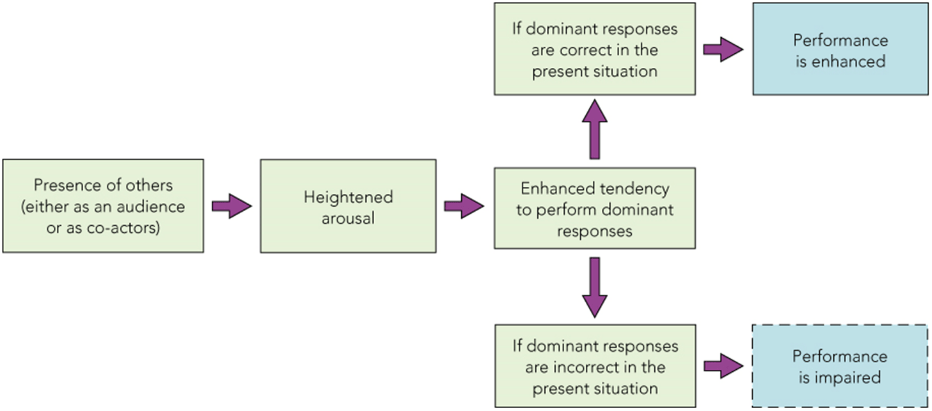5.6 KiB
8. Behaviors in Group
PSYG2504 Social Psychology
8.1 What is group?
Two or more people who interact and are interdependent in the sense that their needs and goals cause them to influence each other.
8.1.1 Why do people join groups?
- Allow us to accomplish objectives that would be more difficult to meet individually.
- A substantial survival advantage to establishing bond with other people.
- Help us define who we are (i.e. identity).
8.1.2 Behaviour in the Presence of others
- Any differences of your behavior when you are doing it alone and performing in front of others? (Singing in the bathroom Vs singing in public?).
- The presence of others sometimes enhances and sometimes impairs an individual’s performance
In summary: whether social facilitation or social loafing occurs depends on
- Whether individuals are identifiable.
- Task complexity.
- How much participants care about the outcome.
8.2 Social Facilitation
When people are in the presence of others and their individual performances can be evaluated, the tendency to perform better on simple tasks and worse on complex tasks.
Michaels et al. (1982) Studied pool players in a college student union building. Pairs of players who were above or below average were identified and scores were secretly recorded. Teams of 4 confederates approached the players. Poor players: accuracy dropped from 36 to 25%. Good players: accuracy rose from 71 to 80%.
Michaels et al. (1982) Studied pool players in a college student union building. Pairs of players who were above or below average were identified and scores were secretly recorded. Teams of 4 confederates approached the players. Poor players: accuracy dropped from 36 to 25%. Good players: accuracy rose from 71 to 80%.
8.2.1 Drive Theory of Social Facilitation/Inhibition (ZAJONC ET AL., 1969)
- Mere presence: The presence of others make us more alert. The alertness causes mild arousal.
- Evaluation Apprehension: (Cottrell, Wack, Sekerak & Rittle, 1968) You feel as if the other people are evaluating you.
- Distraction: (Baron, 1986) The conflict produced when an individual attempts to pay attention to the other people present and to the task being performed. It is difficult to pay attention to two things at the same time as the divided attention produces arousal.
Social facilitation and social inhibition occur when a person’s performance can be evaluated both by the individual and by observers. What would happen if the contributions of each member of a group could not be evaluated individually?
8.3 Social Loafing
When people are in the presence of others and their individual performances cannot be evaluated, the tendency to perform worse on simple or unimportant tasks but better on complex or important tasks.
When an individual’s contribution to a collective activity cannot be evaluated, individuals often work less hard than they would alone.
8.3.1 Collective Effort Model (CEM) (Karau and Williams; 1993, 1995)
Social loafing depends on
- How important the person believes his/her contribution is to group success.
- How likely that better performance will be recognized and rewarded.
- How much the person values group success.
Social loafing will be weakest when
- they expect their coworkers to perform poorly.
- individuals work in small rather than big groups.
- they perceive that their contributions to the group product are unique and important.
- they work on tasks that are intrinsically interesting.
- when they work with respected others, e.g. friends.
8.3.2 Reducing Social Loafing
- Make each person’s contribution identifiable.
- Provide rewards for high group productivity.
- Make task meaningful, complex, or interesting.
- A strong commitment to the ‘team’.
- Keep work groups small.
8.3.3 Social compensation
Occurs when a person expends great effort to compensate for others in the group. When others are performing inadequately, and the person cares about the quality of the group product.
8.3.4 Other Factors
Gender
-
Stronger in men than in women (Karau & Williams, 1993)
-
Women tend to be higher in relational interdependence, i.e. focus on and care about personal relationships
Cultures
- Stronger in Western cultures than Asian cultures (Karau & Williams, 1993).
- Social loafing has been found in India, Thailand, Japan, Malaysia and China.
- People in collectivistic culture value group achievement more.
8.4 Deindividuation
The loosening of normal constraints on behavior when people can’t be identified (such as when they are in crowd).
Diener et al. (1976) Researchers stationed at 27 homes waiting for children who were trick-or-treating on Halloween. IV1: anonymous (no name asked) or identified (names asked). IV2*: alone or in groups. Children were given an opportunity to steal extra candy when the adult was not present. Those children who have been asked names (identified) were less likely to steal.
Deindividuation increases when individuals are anonymous and as group size increases.
Make people feel less accountable for their actions when they recognize there is a reduced likelihood that they can be singled out and blamed for their behavior (Zimbardo, 1970).
Increases obedience to group norms (Postmes & Spears, 1998).
Does not always lead to aggressive or antisocial behavior, it depends on what the group norm is.
Deindividuation online: People feel less inhibited about what they write because of their anonymity.
